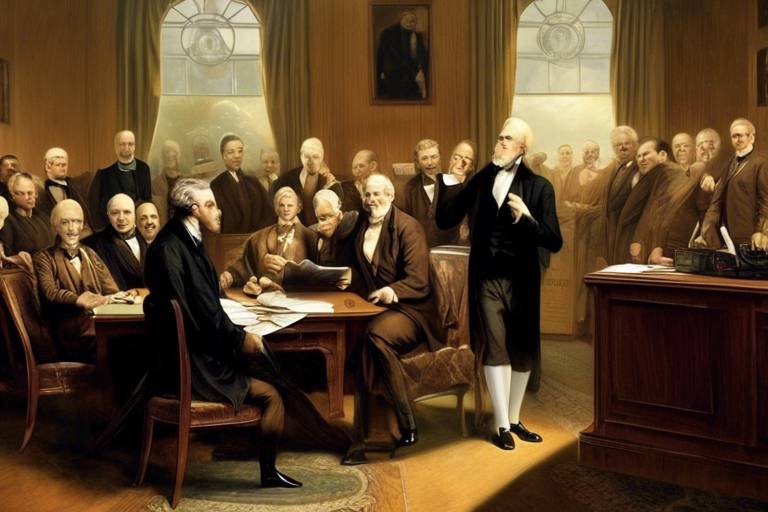Philosophy and Politics: Understanding Representation
In our ever-evolving world, the interplay between philosophy and politics is not just a topic for academic debate; it's a living, breathing phenomenon that affects each one of us. The concept of representation stands at the heart of political philosophy, acting as a bridge between the governed and those in power. But what does it truly mean to represent someone? Is it merely about casting votes or is it something much deeper—an embodiment of the values, aspirations, and concerns of a community? This article dives into the intricate relationship between these two realms, shedding light on how representation shapes our political landscape.
Representation is more than just a buzzword; it’s a vital mechanism that allows individuals to voice their opinions, rights, and needs within a political framework. Imagine a vast orchestra, where each instrument must harmonize to create a beautiful symphony. In this analogy, each citizen represents a note, contributing to the overall melody of society. Without proper representation, the music becomes discordant, leading to a cacophony of dissent and discontent. As we explore this topic, we’ll uncover how various philosophical perspectives inform our understanding of representation and its implications for governance.
The significance of representation cannot be overstated. It encompasses the idea that every individual deserves a voice in the decision-making processes that affect their lives. This is a fundamental principle of democracy, yet its execution often falls short. For instance, consider the principles laid out by influential philosophers throughout history. Their ideas have shaped our current political systems, but they also prompt us to question: Are we truly represented? Are our leaders reflecting our values, or are they merely puppets dancing to the tune of special interests?
As we delve deeper into the philosophical underpinnings of representation, we will examine historical perspectives that have paved the way for contemporary thought. From the ancient musings of Plato and Aristotle to modern theories that advocate for equity and inclusion, the evolution of representation is a fascinating journey. Each era has brought its unique challenges and insights, shaping our understanding of what it means to represent the people.
In summary, the concept of representation is a multifaceted and vital component of political philosophy. It serves as a reminder that governance is not a one-way street; it requires active participation and engagement from all citizens. As we continue to explore this topic, we will uncover the historical perspectives and modern theories that illuminate the ongoing challenges and transformations within the realm of representation.
- What is representation in politics?
Representation in politics refers to the ways in which individuals or groups are represented in decision-making processes, ensuring that their voices and interests are heard and considered.
- Why is representation important?
Representation is crucial because it ensures that diverse perspectives are included in governance, promoting fairness, accountability, and legitimacy in political systems.
- How has representation evolved over time?
Representation has evolved from ancient philosophical theories to modern practices that emphasize equity and inclusion, reflecting changing societal values and norms.
- What challenges does representation face today?
Contemporary challenges include voter disenfranchisement, gerrymandering, and the influence of social media, which can distort the representation of various groups in politics.

The Concept of Representation
Representation is a cornerstone of political philosophy, acting as a bridge between citizens and their governing bodies. But what exactly does it mean to represent someone? At its core, representation involves individuals or groups acting on behalf of others, making decisions that reflect the interests, needs, and desires of the populace. This fundamental concept shapes political systems and governance, highlighting the intricate dynamics between authority and accountability. Without representation, how can we ensure that our voices are heard in the corridors of power?
The significance of representation cannot be overstated. In a democratic society, it serves as a mechanism to ensure that diverse perspectives are included in the decision-making process. Think of representation as a tapestry, where each thread represents a different viewpoint or experience. When woven together, these threads create a rich and vibrant fabric that reflects the society's collective identity. Conversely, a lack of representation can lead to disenfranchisement and alienation, leaving marginalized groups without a voice.
To understand the complexities of representation, we must consider its various forms. There are several dimensions to representation, including:
- Descriptive Representation: This refers to the extent to which elected representatives mirror the demographic characteristics of their constituents, such as race, gender, and socioeconomic status.
- Substantive Representation: This focuses on whether representatives advocate for the interests and needs of their constituents, regardless of their own backgrounds.
- Symbolic Representation: This pertains to the ways in which representatives embody the values and aspirations of their constituents, often serving as role models or figures of inspiration.
Each of these forms plays a crucial role in how representation is perceived and enacted within political systems. For instance, a government that is descriptively representative may still fail in substantive representation if it does not address the pressing needs of the community. This highlights the importance of not just having representatives who look like us, but also those who truly understand and advocate for our interests.
Furthermore, the relationship between representation and democracy is complex and multifaceted. In an ideal democratic framework, representation should empower citizens, allowing them to influence policies that affect their lives. However, when representation is compromised—whether through voter suppression, gerrymandering, or other forms of manipulation—the very foundation of democracy is threatened.
In conclusion, the concept of representation is not merely a theoretical construct; it is a living, breathing aspect of our political landscape that demands continuous examination and improvement. As we navigate the challenges of modern governance, understanding representation’s nuances will be key to fostering a more equitable and inclusive political environment.

Historical Perspectives on Representation
The concept of representation has undergone a fascinating evolution throughout history, shaped by the thoughts and actions of various philosophers and political movements. Understanding these historical perspectives is crucial for grasping how contemporary political systems have been influenced by past ideas. From the ancient Greeks to modern democratic theories, representation has been a central theme in the discourse of governance. It is not merely a mechanism for electing leaders; it is a profound reflection of societal values and collective identity.
In ancient times, representation was often linked to the ideas of aristocracy and oligarchy. Philosophers like Plato and Aristotle laid foundational theories that continue to resonate today. Plato’s vision of an ideal state governed by philosopher-kings highlighted the belief that only those with superior knowledge and wisdom should represent the populace. This raises an intriguing question: should representation be left to the educated elite, or should it be more inclusive?
Aristotle, on the other hand, offered a more pragmatic approach. He proposed a mixed government model that combined elements of democracy and oligarchy, advocating for a system where diverse voices could contribute to governance. This idea of diversity in representation is vital, as it reflects the multifaceted nature of society. Aristotle’s thoughts remind us that a balanced representation is necessary to prevent any single group from monopolizing power, a concern that remains relevant in today's political landscape.
As we moved into the Renaissance and Enlightenment periods, the ideas surrounding representation began to shift dramatically. Thinkers like John Locke and Jean-Jacques Rousseau championed the notion of the social contract, emphasizing the idea that governments derive their legitimacy from the consent of the governed. This marked a significant turning point, as it placed the power of representation firmly in the hands of the people. Rousseau, in particular, argued for a direct form of democracy where citizens actively participate in decision-making, a stark contrast to the elitist views of earlier philosophers.
Fast forward to the modern era, and we encounter a myriad of challenges and developments in the realm of representation. The American Revolution and the subsequent formation of democratic governments across the globe were pivotal in redefining representation. The establishment of voting rights became a crucial aspect, as it allowed individuals to have a say in their governance. However, this was not without its complexities. Various groups, particularly women and minorities, fought long and hard for their voices to be included in the political arena, showcasing the ongoing struggle for equitable representation.
Today, the historical perspectives on representation remind us that it is not a static concept but rather a dynamic and evolving one. Each era has contributed layers of meaning and complexity to what it means to be represented in a political system. The interplay between historical thought and modern practice continues to shape our understanding of democracy and governance.
- What is the significance of representation in politics?
Representation is crucial as it ensures that the voices of diverse groups within society are heard and considered in governance, promoting equity and justice. - How have historical perspectives influenced modern representation?
Historical thinkers laid the groundwork for contemporary theories of representation, emphasizing the importance of consent, diversity, and the role of the citizen in governance. - What challenges does representation face today?
Current challenges include voter disenfranchisement, gerrymandering, and the impact of social media, all of which can distort fair representation in political systems.

Classical Theories of Representation
When we dive into the realm of classical theories of representation, we find ourselves grappling with the ideas of two towering figures in philosophy: Plato and Aristotle. These ancient thinkers set the stage for how we understand the relationship between the governed and their governors. Their insights not only shaped political thought in their time but continue to influence modern discourse on representation.
Starting with Plato, he envisioned a society led by philosopher-kings, individuals who possess both wisdom and virtue. In his work, The Republic, Plato argued that only those who truly understand the good should have the power to govern. This notion raises profound questions: Who qualifies as a philosopher-king? And can knowledge alone ensure just representation? Plato believed that the ideal state would be one where rulers are enlightened and capable of making decisions that reflect the true needs of the populace. However, this leads us to consider the potential dangers of elitism, where the majority may feel excluded from the decision-making process.
On the flip side, we have Aristotle, who took a more pragmatic approach to governance. He proposed a mixed government model, combining elements of democracy and oligarchy. Aristotle argued that a diverse representation is essential for balancing power within a political system. In his view, a government should reflect the interests of all social classes, ensuring that no single group dominates. This idea is particularly relevant today as we grapple with issues of representation across different demographics. Aristotle's perspective invites us to ponder: How can we ensure that all voices are heard in a system that often favors the powerful?
Both philosophers recognized that representation is not merely about casting votes; it’s about the quality of those who represent us and their ability to understand and articulate the needs of the community. This leads us to a critical point in our exploration of representation: the tension between knowledge and inclusivity. While Plato’s ideal suggests that only the most knowledgeable should govern, Aristotle’s model advocates for a more inclusive approach. This dichotomy sets the foundation for ongoing debates about who should represent whom in our political systems.
In summary, the classical theories of representation laid down by Plato and Aristotle continue to resonate in today’s political landscape. Their ideas challenge us to think critically about the nature of representation and the qualifications necessary for effective governance. As we navigate the complexities of contemporary politics, we must ask ourselves: Are we prioritizing knowledge, inclusivity, or a balance of both in our quest for true representation?

Plato's Ideal State
Plato's vision of an ideal state is nothing short of fascinating. In his seminal work, "The Republic," he introduces the concept of a society ruled by philosopher-kings—individuals who possess not just power, but also wisdom and knowledge. Imagine a world where leaders are not just politicians but thinkers who have deeply contemplated the nature of justice, virtue, and the good life. This idea raises profound questions about representation and governance: Who is truly qualified to lead? Plato believed that only those who understand the Forms, particularly the Form of the Good, should have the right to govern. This perspective suggests that representation should be based on knowledge and virtue rather than popularity or wealth.
In Plato's ideal state, the structure is meticulously organized into three distinct classes: the rulers (philosopher-kings), the guardians (warriors), and the producers (farmers, artisans, and merchants). Each class has its own role and responsibilities, ensuring that the state functions harmoniously. The rulers, with their superior knowledge, make decisions for the benefit of all, while the guardians protect the state, and the producers provide for the community's material needs. This division of labor is essential for achieving the common good, which is the ultimate goal of Plato's political philosophy.
However, this raises an intriguing dilemma: Is it just to have a ruling class that is so detached from the everyday lives of citizens? Plato's model suggests that the average citizen may lack the necessary knowledge to make informed decisions about governance. This creates a potential disconnect between the rulers and the ruled. While the philosopher-kings are meant to act in the best interest of the populace, one could argue that their detachment might lead to decisions that do not reflect the desires or needs of the common people. Thus, the question of representation becomes even more complex—should the government be run by experts, or should it be more democratic, allowing for broader participation?
Furthermore, Plato's ideal state invites us to consider the implications of meritocracy in political representation. In a society where only the most knowledgeable are allowed to govern, how do we ensure that diverse voices and perspectives are included? The risk of elitism looms large, as the criteria for being a philosopher-king could inadvertently exclude those who possess valuable insights but lack formal education or status. This brings us to the modern challenge of balancing expertise with inclusivity in political systems.
In conclusion, while Plato's idea of an ideal state offers a compelling vision of governance led by wisdom and knowledge, it also prompts critical questions about representation, inclusivity, and the potential for elitism. As we navigate the complexities of modern politics, his ideas remain relevant, urging us to reflect on who we allow to represent us and the qualities that truly matter in our leaders.

Aristotle's Mixed Government
Aristotle's vision of a mixed government is a fascinating blend of different political systems, which he believed could create a balanced and stable society. In his seminal work, Politics, he argued that no single form of government—be it democracy, oligarchy, or monarchy—could adequately address the complexities of human society on its own. Instead, he proposed a system that incorporates elements from each of these forms, which he believed would help prevent the excesses and pitfalls that often accompany pure systems. This approach is not just theoretical; it serves as a practical guide for governance, aiming to balance the interests of various social classes and prevent tyranny.
At the heart of Aristotle's mixed government is the idea of diverse representation. He recognized that people have different interests and priorities based on their social status, wealth, and education. By combining democratic principles—where the majority has a voice—with oligarchic elements that represent the wealthier and more educated segments of society, Aristotle aimed to create a more equitable political landscape. This framework encourages the participation of a broad spectrum of citizens, fostering a sense of ownership and responsibility towards governance.
One of the most compelling aspects of Aristotle's mixed government is its emphasis on the rule of law. He believed that laws should apply equally to all citizens, regardless of their social standing. This principle is crucial because it ensures that no single group can dominate the political arena, thus protecting the rights of minorities and promoting social harmony. Aristotle’s model suggests that a well-structured government should include checks and balances that allow for accountability and transparency, thereby enhancing the legitimacy of political authority.
In practical terms, Aristotle's mixed government can be visualized as a three-tiered system:
| Tier | Government Type | Role |
|---|---|---|
| 1 | Democracy | Representation of the majority; ensures that the voice of the common people is heard. |
| 2 | Oligarchy | Representation of the wealthy and educated; provides expertise and stability. |
| 3 | Monarchy | Leadership and decisiveness; offers a figurehead for unity and continuity. |
By integrating these three components, Aristotle believed that a mixed government could harness the strengths of each system while mitigating their weaknesses. This balance not only promotes political stability but also encourages civic engagement, as citizens feel their interests are represented in multiple ways. However, Aristotle also warned of the dangers that could arise if one element became too dominant, leading to the potential for corruption or tyranny. Thus, the challenge remains for modern governments to implement these principles effectively to ensure fair representation and a thriving democracy.
- What is Aristotle's mixed government? Aristotle's mixed government is a political framework that combines elements of democracy, oligarchy, and monarchy to create a balanced and stable society.
- Why is diverse representation important in Aristotle's theory? Diverse representation ensures that the interests of various social classes are considered, promoting equity and preventing the domination of any single group.
- How does Aristotle's mixed government relate to modern political systems? Many modern democracies incorporate elements of Aristotle's mixed government by balancing representation across different social strata and ensuring the rule of law.

Modern Theories of Representation
In our fast-paced world, the concept of representation has evolved significantly, adapting to the complexities of contemporary society. Modern theories of representation delve into the nuances of how diverse identities, backgrounds, and experiences shape political landscapes. These theories challenge traditional notions by emphasizing the importance of equity and inclusion in political representation. One of the most compelling aspects of modern representation is the focus on identity politics, where individuals are represented not just by their electoral choices but by their lived experiences and cultural backgrounds. This shift raises an intriguing question: can a political system truly reflect the diversity of its constituents?
To explore this further, let’s consider the role of various social movements that have emerged over the past few decades. Movements advocating for gender equality, racial justice, and LGBTQ+ rights have profoundly influenced how representation is understood today. These movements highlight that representation is not merely a numbers game; it is about ensuring that all voices are heard and valued. For instance, when women or minority groups are underrepresented in government, it signals a systemic issue that can lead to policies that do not cater to the needs of the entire population.
Moreover, modern theories also address the impact of technology on representation. The rise of social media platforms has transformed how political discourse occurs, allowing for more direct communication between representatives and constituents. However, this has also led to challenges such as the spread of misinformation and the echo chamber effect, where individuals only engage with viewpoints that mirror their own. As a result, the question arises: does technology enhance representation by giving a voice to the voiceless, or does it complicate the landscape by creating divisions?
In addition to these challenges, modern theories advocate for a more participatory approach to democracy. This means encouraging citizens to engage actively in the political process, not just during elections but throughout their governance. This can take many forms, including town hall meetings, online forums, and community organizing. Such participatory mechanisms can help bridge the gap between citizens and their representatives, fostering a sense of ownership and accountability within the political system.
Ultimately, modern theories of representation call for a re-examination of who gets to speak for whom in the political arena. They challenge us to think critically about the structures that govern our societies and to advocate for systems that are truly reflective of our diverse populations. As we navigate these complexities, the conversation around representation will undoubtedly continue to evolve, pushing us towards a more inclusive and equitable future.
- What is representation in politics? Representation in politics refers to the ways in which elected officials and institutions reflect the interests and demographics of the population they serve.
- Why is representation important? Representation is crucial because it ensures that diverse voices and perspectives are included in the decision-making process, leading to more equitable and effective governance.
- How do modern theories of representation differ from classical theories? Modern theories emphasize identity, equity, and the impact of technology on political engagement, whereas classical theories often focused on broader concepts of governance and the role of elites.
- What role does technology play in representation? Technology can enhance representation by facilitating communication and engagement, but it also poses challenges such as misinformation and polarization.

Challenges to Representation
Despite its critical role in shaping democratic governance, the concept of representation is fraught with challenges that threaten its very essence. One of the most pressing issues is voter disenfranchisement, which occurs when eligible citizens are systematically prevented from exercising their right to vote. This can take many forms, including strict voter ID laws, purging of voter rolls, and limited access to polling places. Each of these tactics not only undermines the principle of representation but also raises questions about the fairness and inclusivity of our political systems. Imagine a game where only some players are allowed to participate; it simply wouldn’t be fair, right? This is the reality for many individuals who find themselves excluded from the democratic process.
Another significant challenge is gerrymandering, a practice that manipulates electoral district boundaries to favor one political party over another. This can lead to bizarrely shaped districts that often defy logical geographic boundaries, creating an electoral landscape that is more about political advantage than fair representation. For instance, a district might be drawn to include a majority of voters from a single party, effectively diluting the votes of those from opposing parties. The ethical implications of such practices are profound, as they not only skew representation but also erode public trust in the electoral process.
Moreover, the rise of social media has introduced new dynamics into the political arena, complicating the landscape of representation further. While social media platforms can amplify voices that are often marginalized, they can also spread misinformation and create echo chambers that distort public discourse. This duality raises critical questions: Are we truly represented if our perceptions are shaped by algorithms rather than genuine dialogue? The ability of social media to influence political opinions can lead to a misrepresentation of public sentiment, as it often prioritizes sensationalism over substantive discussion.
In light of these challenges, it becomes essential to consider how we can strengthen the mechanisms of representation in our political systems. Addressing voter disenfranchisement requires a concerted effort to ensure that every voice is heard and valued. This might involve legislative reforms aimed at protecting voting rights, enhancing accessibility, and promoting civic education. Similarly, tackling gerrymandering could involve independent redistricting commissions that prioritize fairness and transparency in the drawing of electoral maps.
As we navigate the complexities of modern governance, it’s crucial to remain vigilant about the challenges to representation. By fostering an environment where every individual has the opportunity to participate meaningfully in the political process, we can work towards a more equitable and just society. After all, representation should not be a privilege for the few, but a right for all.
1. What is voter disenfranchisement?
Voter disenfranchisement refers to practices that prevent eligible individuals from voting, such as strict ID laws, voter roll purges, and limited polling access.
2. How does gerrymandering affect elections?
Gerrymandering manipulates district boundaries to favor one political party, which can dilute the votes of opposing parties and undermine the fairness of elections.
3. What role does social media play in political representation?
Social media can amplify marginalized voices but also spread misinformation and create echo chambers, complicating the representation of public sentiment.
4. How can we improve representation in politics?
Improving representation may involve reforms to protect voting rights, enhance accessibility, and implement independent redistricting to ensure fair electoral maps.

Voter Disenfranchisement
Voter disenfranchisement is a critical issue that undermines the very essence of democracy. It refers to the systematic exclusion of individuals from participating in the electoral process, effectively silencing their voices in governance. Imagine trying to shout in a crowded room, but no one can hear you because barriers have been erected to muffle your voice. This is the reality for many citizens who find themselves disenfranchised. The implications of this exclusion are profound, as it not only affects the individuals directly impacted but also the broader society, which loses out on diverse perspectives and the full spectrum of public opinion.
Disenfranchisement can take many forms, ranging from legal restrictions to social and economic barriers. For instance, laws requiring specific forms of identification can disproportionately affect marginalized communities who may lack access to such documents. Additionally, factors like poverty, lack of transportation, and limited access to information can make it exceedingly difficult for certain groups to cast their votes. The result? A political landscape that fails to accurately reflect the will of the people.
To illustrate the various dimensions of voter disenfranchisement, consider the following table that outlines some common forms:
| Form of Disenfranchisement | Description |
|---|---|
| Voter ID Laws | Requirements for specific identification can exclude those without access to ID. |
| Felon Disenfranchisement | Individuals with felony convictions often lose their voting rights, sometimes permanently. |
| Polling Place Closures | Reducing the number of polling places can lead to long lines and accessibility issues. |
| Limited Voting Hours | Restricting voting times can make it difficult for working individuals to participate. |
Furthermore, the impact of disenfranchisement extends beyond the immediate act of voting. It erodes trust in the political system, leading to apathy and disengagement among citizens. When people feel that their votes do not matter or that they are systematically excluded, they are less likely to participate in civic activities, further perpetuating a cycle of disenfranchisement. It's a vicious cycle that can be challenging to break.
As we navigate the complexities of representation in politics, it is crucial to address the barriers that disenfranchised individuals face. Advocacy for fair voting practices, increased accessibility, and public awareness campaigns are essential steps toward ensuring that every voice is heard and every vote counts. After all, a democracy thrives when all its citizens can participate fully and freely.
- What is voter disenfranchisement? Voter disenfranchisement refers to the exclusion of individuals from the electoral process, preventing them from exercising their right to vote.
- What are some common causes of voter disenfranchisement? Common causes include voter ID laws, felony disenfranchisement, polling place closures, and limited voting hours.
- How does voter disenfranchisement affect democracy? It undermines the principle of equal representation, leading to a political landscape that does not reflect the will of all citizens.
- What can be done to combat voter disenfranchisement? Advocacy for fair voting practices, public awareness campaigns, and legislation aimed at increasing accessibility can help combat disenfranchisement.

Gerrymandering and Its Effects
Gerrymandering is a term that often raises eyebrows and sparks heated debates. But what does it really mean? In simple terms, gerrymandering refers to the practice of manipulating electoral district boundaries to favor a particular political party or group. This practice can have profound implications for the democratic process, often leading to a significant distortion of representation. Imagine a game of chess where one player can change the board layout to ensure they always win; that's somewhat akin to what gerrymandering does to our electoral system.
The effects of gerrymandering extend far beyond mere political maneuvering. It can lead to unfair representation, where the voices of certain demographics are amplified while others are muted. For instance, when district lines are drawn to pack voters of one party into a single district, it can dilute their overall influence in surrounding areas. This not only undermines the principle of equal representation but can also foster a sense of disenfranchisement among voters who feel their choices don’t matter.
Furthermore, gerrymandering can contribute to increased polarization within the political landscape. When districts are engineered to favor a specific party, candidates may cater to the extremes of their base, leading to less compromise and collaboration. This can create a vicious cycle where moderates are squeezed out, and political discourse becomes more divisive. The result? A political environment where cooperation is rare, and gridlock becomes the norm.
To illustrate the impact of gerrymandering, let’s consider a hypothetical scenario. Suppose a state has a population that is evenly split between two major political parties. If district lines are drawn in a way that creates several "safe" districts for one party, that party may secure a disproportionate number of seats in the legislature, despite having only a slight majority in the overall population. Here’s a simplified table to show how this might look:
| Party | Votes | Seats Won |
|---|---|---|
| Party A | 55,000 | 8 |
| Party B | 45,000 | 2 |
In this example, Party A wins 80% of the seats despite only receiving 55% of the votes, showcasing the disproportionate impact of gerrymandering. This not only affects the balance of power within a state but also has ripple effects on national politics, influencing everything from policy decisions to the allocation of federal resources.
As we navigate the complexities of modern governance, it’s crucial to recognize the challenges posed by gerrymandering. Advocates for electoral reform argue for independent redistricting commissions to create fairer district maps, ensuring that the electoral process remains a true reflection of the will of the people. After all, a healthy democracy thrives on the principle that every vote counts equally, and gerrymandering threatens to undermine that very foundation.
- What is gerrymandering? Gerrymandering is the manipulation of electoral district boundaries to favor a specific political party or group.
- How does gerrymandering affect elections? It can lead to unfair representation, increased political polarization, and a significant distortion of the electoral process.
- What are some solutions to gerrymandering? Solutions include establishing independent redistricting commissions to ensure fair and impartial drawing of district lines.
Frequently Asked Questions
- What is the concept of representation in politics?
Representation in politics refers to the way in which citizens are represented by elected officials or institutions. It's crucial because it shapes how power is distributed and how policies are created. Essentially, it’s about ensuring that the voices of the populace are heard and considered in governance.
- How has the idea of representation evolved over time?
The idea of representation has transformed significantly throughout history, influenced by various philosophers and political movements. From the early thoughts of Plato and Aristotle to modern discussions about equity and inclusion, each era has added layers of complexity to how we understand who gets to represent whom.
- What are some classical theories of representation?
Classical theories of representation, notably those proposed by Plato and Aristotle, laid the groundwork for modern political thought. Plato's vision of philosopher-kings emphasized knowledge, while Aristotle's mixed government model highlighted the importance of diverse representation to maintain balance in power.
- What challenges does representation face today?
Today, representation faces numerous challenges, such as voter disenfranchisement, gerrymandering, and the influence of social media. These issues can undermine the democratic process and lead to significant disparities in how different groups are represented and heard in political discourse.
- What is voter disenfranchisement and why is it a concern?
Voter disenfranchisement occurs when individuals are prevented from voting or having their votes counted, which directly undermines the principle of representation. It raises serious concerns about democracy and civic engagement, as it can lead to a lack of accountability from elected officials.
- How does gerrymandering affect political representation?
Gerrymandering manipulates electoral district boundaries to favor particular political parties, which can distort the true representation of voter preferences. This practice raises ethical questions about fairness and integrity in the electoral process, ultimately impacting how well the government reflects the will of the people.



















